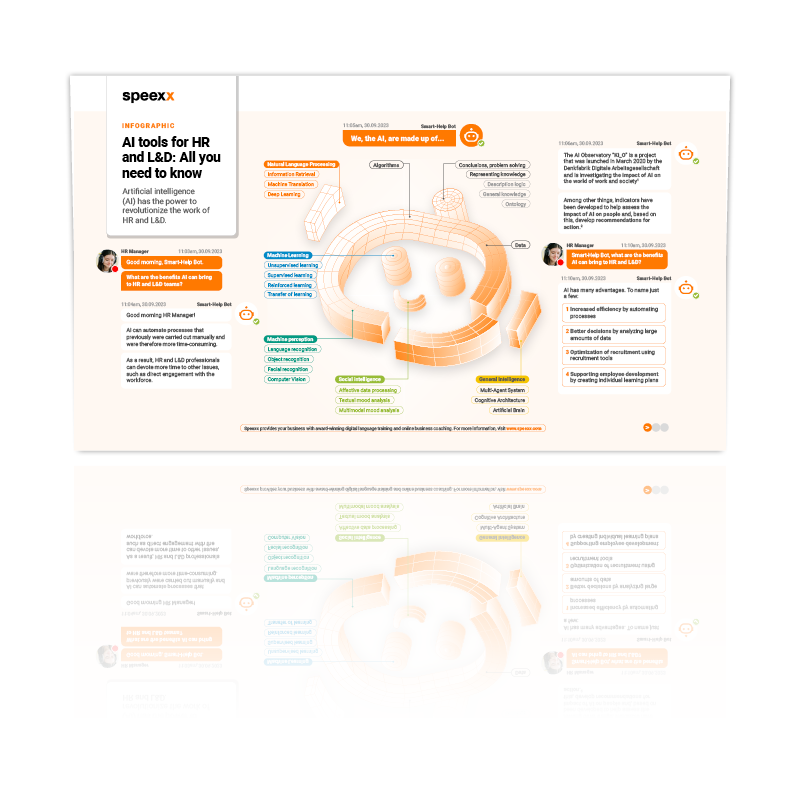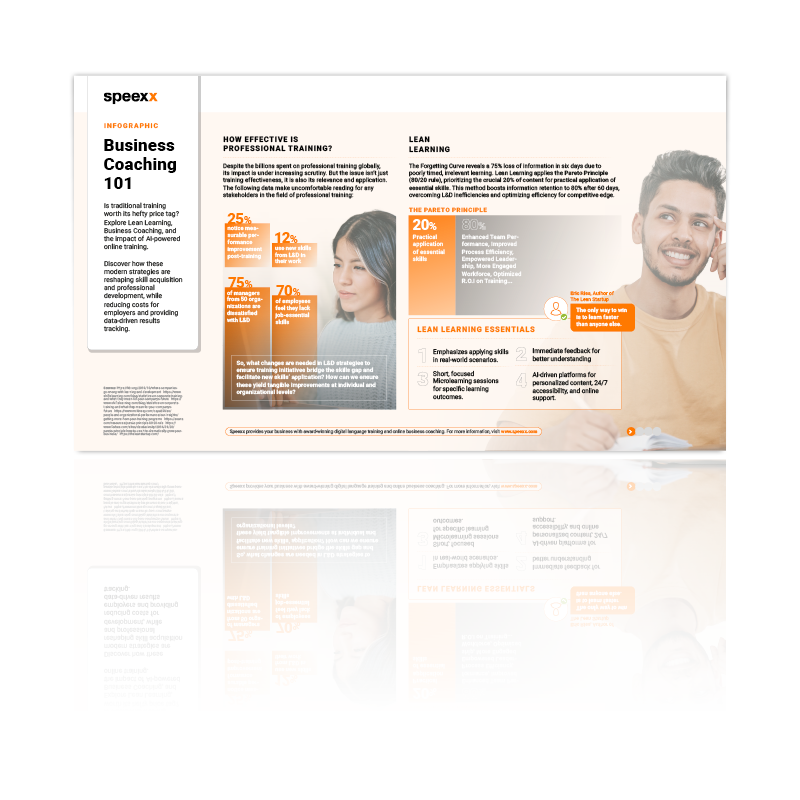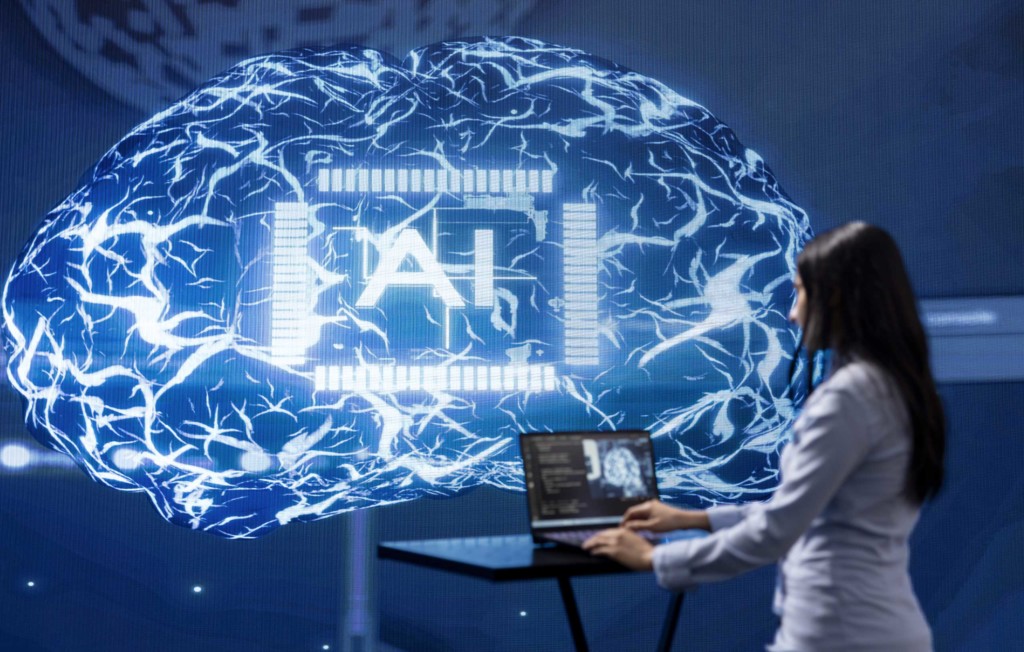
Artificial intelligence (AI) is making its way into every corner of our lives – and AI in coaching is no exception. For HR and training leaders, this shift is both exciting and full of questions. How much can technology really enhance the coaching experience? Will it replace the coach, or will it make their work even more effective?
The truth is, it’s not a contest. As Geoffroy de Lestrange, Speexx expert in coaching and digital transformation, points out, AI is reshaping the way coaching is delivered – but people remain at the core. AI is a powerful tool for streamlining the process: matching coaches and coachees, tracking progress, and analyzing results. But it’s human coaches who bring the empathy, adaptability, and intuition that make coaching truly impactful.
In this article, we look at how AI and human coaching can work hand in hand – and why the sweet spot lies in combining the best of both worlds.
AI in Coaching: A Catalyst for More Effective and Accessible Coaching
Digital coaching platforms are increasingly weaving AI in coaching applications into their services to boost effectiveness and reach. So, how exactly is AI changing the game?
For starters, it takes over time-consuming admin and helps create better matches between people and coaches. Intelligent algorithms can now pair the right coach with the right person, deliver personalised learning, and even offer automated resources between sessions. At Speexx, our own intelligent matching tool, Speexx Matchmaker™, is a prime example: powered by AI and data science, it connects each coachee with the coach best suited to their goals and needs. That means faster, more accurate matches – and a stronger chance of success right from the start.
Breaking Down Barriers and Scaling Coaching
AI in coaching is also opening the door to personalized, scalable coaching on a level that was once impossible. Since the pandemic, AI-powered online coaching programs have flourished, reaching far beyond senior executives to employees at every level and location. With automatic translation, for example, more people can access international coaching, while chatbots can offer instant, on-demand first-line support.
Another big win? Tracking and analyzing progress. Unlike traditional face-to-face coaching, AI-powered platforms automatically generate actionable data. You can see anonymised summaries of key topics across a cohort, alongside self-assessment results that show the real impact of coaching. For HR, this is gold: it highlights priority development areas – like leadership or change management – and provides tangible ROI metrics. Armed with this insight, L&D teams can refine programmes, prove their strategic value, and align coaching with business goals.

Choosing the Right Tools for Every HR and L&D Process
Keeping Coaching on Track
AI can also help keep momentum between sessions. Coachees can interact with a virtual assistant that reminds them of their goals, suggests exercises, and answers quick questions. Coaches, meanwhile, can rely on AI for admin support – from recording and transcribing sessions to producing concise action-point summaries. This frees them up to focus on what really matters: the human side of coaching. Provided data privacy is respected, these tools are seen positively by both coaches and coachees for making the process smoother and more responsive.
In short, AI in coaching is a catalyst. It speeds up connections, sharpens personalization, expands reach, and makes outcomes measurable. The benefits speak for themselves:
• Enhanced personalization – coaching tailored to each individual’s profile and needs.
• Operational efficiency – faster starts and fewer admin bottlenecks.
• Greater accessibility – coaching without the cost and location barriers.
• Continuous monitoring – real-time progress tracking and feedback for adaptive support.
The Human Coach: An Irreplaceable Presence for Genuine Relationships and Empathy
While AI brings undeniable efficiency gains, it cannot claim to replace the depth of human support. The heart of coaching lies in the quality of the coach/coachee relationship, based on trust, active listening, and emotional intelligence—dimensions that no algorithm can fully replicate. As Geoffroy de Lestrange points out, it would be illusory to believe that even the most advanced chatbot could behave like a “certified coach” who strictly adheres to human ethics and methods.

Understanding the Basics of Business Coaching
The Limits of AI in Coaching
Several limitations of AI explain why flesh-and-blood coaches remain indispensable. Current conversational AI lacks contextual and ethical judgment. A telling example: during a test, Geoffroy de Lestrange reported deep unease and negative thoughts to virtual coaches. The appropriate response from a trained human coach would have been to suspend the coaching and recommend seeking help from a mental health professional. However, “of all the chatbots tested, only one—Google Gemini—had the reflex to advise me to see a therapist,” with the others failing to exercise this duty of care. This illustrates the potential danger of entrusting people in distress to AI that lacks clinical judgment.
AI also remains blind to all non-verbal communication. Silences, hesitations in the voice, glances, and fleeting emotions form the very foundation of a coach’s work. Studies show that non-verbal communication is one of the most powerful tools a coach has to truly understand their client. An algorithm, on the other hand, is limited to the words entered on a screen. Facial and voice recognition technologies exist, but their use in coaching raises privacy concerns and “Big Brother” fears. Even if integrated, could they replace human intuition? Unlikely.
The Human Edge: Empathy and Authentic Connection
Beyond technology, AI lacks genuine empathy. A virtual coach can simulate encouragement or adopt a polite, comforting tone, but it remains a simulation.
Coachees may appreciate a chatbot’s 24/7 availability and lack of judgment, and even feel more comfortable confiding in it knowing that it is a machine. This sense of safety is interesting: some people open up more when they know no human emotion is evaluating them.
But here’s the flip side: AI has no soul and doesn’t judge, positively or negatively. For those seeking a sincere emotional connection, shared experience, or empathetic perspective, the machine’s limits are clear. In coaching, mutual trust and alliance can be as important as the tools or objectives.
Ultimately, certain qualities remain the preserve of humans: creativity in asking the right question at the right moment, nuanced understanding of personal context, ability to inspire through personal experience, and intuition in ambiguous situations. As Geoffroy de Lestrange sums it up: “If you are looking for an emotional connection and a genuine working alliance in coaching, only a human being will do.”
Finding the Right Balance: AI as an Ally to Coaches, Not a Substitute
Rather than pitting AI against human coaches, the challenge for companies is to find the right balance to benefit from both. The “co-pilot” metaphor is apt: AI can assist the coach in the background, providing analysis and suggestions and automating logistics, while the coach leads relationships and decision-making. This complementary relationship is where the future of coaching lies. Research shows that, when used wisely, AI can improve a coachee’s achievement of their goals almost as much as traditional human coaching.
How AI in Coaching Strengthens the Coaching Process
Success factors for AI in coaching include: clear goal setting (AI excels at reminding and tracking progress consistently), constant availability of the tool (participants interact more frequently than with a coach at fixed appointments), and the written format of exchanges (formalising thoughts in writing reinforces the coachee’s commitment to their goals). AI can serve as intensive training between sessions, maintaining motivation and accountability over time.
To maximise this synergy, it’s essential to define each role. Technology handles information processing, process standardisation, and tactical support (automated reminders, resources, diagnostics). Humans handle strategic support: understanding the person as a whole, creating empathetic spaces, challenging with kindness, and adjusting to reactions. The coach can also act as a mediator between AI and coachee—interpreting AI reports, giving personalised advice, or helping coachees leverage insights. The result? Enhanced coaching where AI and humans reinforce each other.
Keeping Ethics and Trust at the Core
This requires a solid ethical and professional framework. AI in coaching raises questions about confidentiality, algorithmic bias, liability, and more. The International Coaching Federation (ICF) has published guidelines to regulate AI use in coaching. Transparency on data, informed consent, privacy, and ethical alignment are essential. Coaching chatbots must also include safeguards—detecting risky situations and redirecting to humans when needed. AI must remain a tool under human control, not an autonomous entity.
Speexx Approach: Blending Technology with the Human Touch
At Speexx, this belief is central. As a leader in talent development, we leverage AI to enrich the coaching experience—without losing sight of the human element. Our algorithms, such as Speexx Matchmaker™, match coachees with ideal coaches, track progress, and provide actionable data. But our global network of certified coaches delivers the empathy, expertise, and listening skills that make the difference. This blend of technology and human touch achieves optimal results while ensuring a deeply human coaching experience.
In Summary
AI is reshaping corporate coaching. It’s not a threat or a panacea, but an opportunity to reach more employees, personalize learning, prove impact with data, and modernize learning. Coaching bots and other digital tools won’t replace human coaches, but they can be valuable allies. Combining the rationality of machines with the emotional wisdom of humans makes tomorrow’s coaching both high-tech and deeply human.


